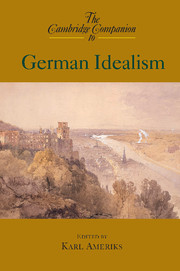Book contents
- Frontmatter
- Introduction
- 1 The Enlightenment and idealism
- 2 Absolute idealism and the rejection of Kantian dualism
- 3 Kant’s practical philosophy
- 4 The aesthetic holism of Hamann, Herder, and Schiller
- 5 All or nothing
- 6 The early philosophy of Fichte and Schelling
- 7 Hölderlin and Novalis
- 8 Hegel’s Phenomenology and Logic
- 9 Hegel’s practical philosophy
- 10 German realism
- 11 Politics and the New Mythology
- 12 German Idealism and the arts
- 13 The legacy of idealism in the philosophy of Feuerbach, Marx, and Kierkegaard
- Bibliography
- Index
9 - Hegel’s practical philosophy
the realization of freedom
Published online by Cambridge University Press: 28 May 2006
- Frontmatter
- Introduction
- 1 The Enlightenment and idealism
- 2 Absolute idealism and the rejection of Kantian dualism
- 3 Kant’s practical philosophy
- 4 The aesthetic holism of Hamann, Herder, and Schiller
- 5 All or nothing
- 6 The early philosophy of Fichte and Schelling
- 7 Hölderlin and Novalis
- 8 Hegel’s Phenomenology and Logic
- 9 Hegel’s practical philosophy
- 10 German realism
- 11 Politics and the New Mythology
- 12 German Idealism and the arts
- 13 The legacy of idealism in the philosophy of Feuerbach, Marx, and Kierkegaard
- Bibliography
- Index
Summary
In Hegel's Encyclopedia system, what we would nowadays call his practical philosophy is called the “philosophy of spirit.” By practical philosophy, we usually mean a philosophical account of the possibility of the distinct sorts of events for which we may appropriately demand reasons or justifications from subjects whom we take to be responsible for such events occurring, or we mean an account of actions, and an assessment of what rightly count as such reasons or justifications. The central problem in other words is the status of the condition usually taken as necessary for such a delimitation of a class of events as actions: freedom. What is it, is it possible, how important is it?
Such a philosophy of spirit has a specific place in Hegel’s systematic enterprise. That system is divided into what looks like the basic or foundational enterprise, a “Science of Logic,” or his own version of a theory of concepts and the possibility of conceptual content (an account of all possible account-giving, as it were); and then into a “Philosophy of Nature” and a “Philosophy of Spirit”; or it relies on some argument about why the very possibility of an objective judgment requires just such delimited contents, that a successful account must be an account either of nature or of spirit.
- Type
- Chapter
- Information
- The Cambridge Companion to German Idealism , pp. 180 - 199Publisher: Cambridge University PressPrint publication year: 2000
- 16
- Cited by



